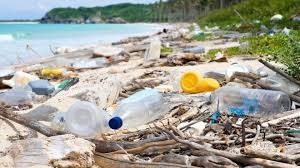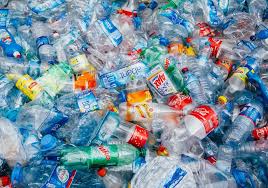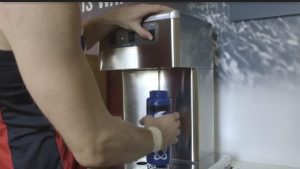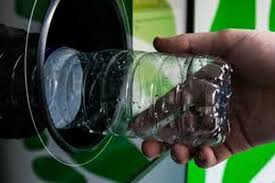Better Recycling with a Deposit Return Scheme (DRS)
Did you know there is just under a week left to tell the Government that you want them to act on plastic? The Government is consulting public opinion on deposit Return Schemes (DRS), which will help significantly reduce the biggest form of plastic pollution in our rivers and oceans, single-use plastic bottles.
Every year in the UK alone, 5.5 billion plastic bottles do not reach any form of recycling process; with many of them find their way to landfill and the oceans. We have all seen the distressing images of turtles tangled in debris and marine animals with stomachs full of plastic. We have all read the reports about the health of our rivers and waterways where plastic bottles represent the highest percentage of pollutants.

 Yes to all the above points including Tetrapak and cartons.
We need a deposit return scheme that includes drinks containers of all materials and sizes in order to start tackling our plastic pollution crisis. Studies have shown that a DRS significantly increases recycling and also a reduction in litter. There is a risk that if certain materials were excluded, producers would switch to these materials in order to avoid responsibility.
Q12. Should the following drinks be in scope of a DRS:
a. Waterb. Soft drinks (excluding juices)c. Juices (fruit and vegetable)
d. Alcoholic drinkse. Milk containing drinks
f. Plant-based drinks (such as soya, rich almond and oat drinks)g. Milk
Again a resounding YES to all containers that house the above drinks. All materials and all sizes.
Yes to all the above points including Tetrapak and cartons.
We need a deposit return scheme that includes drinks containers of all materials and sizes in order to start tackling our plastic pollution crisis. Studies have shown that a DRS significantly increases recycling and also a reduction in litter. There is a risk that if certain materials were excluded, producers would switch to these materials in order to avoid responsibility.
Q12. Should the following drinks be in scope of a DRS:
a. Waterb. Soft drinks (excluding juices)c. Juices (fruit and vegetable)
d. Alcoholic drinkse. Milk containing drinks
f. Plant-based drinks (such as soya, rich almond and oat drinks)g. Milk
Again a resounding YES to all containers that house the above drinks. All materials and all sizes.
 Here at the WCD Group we talk and share a lot of matter on the subject of plastic pollution and in particular single-use. We believe urgent action is needed to tackle the rising pollution crisis, from governments down to individuals. As specialists in hydration we contribute to the passing on plastic movement and we are committed to helping change it for the better.
We think an effective solution is to refill, reuse as well as recycle (DRS). More and more of our customers are choosing plumbed in self fill hydration water coolers, fountains and taps with under counter chillers for staff and visitors to fill their own vessel.
Here at the WCD Group we talk and share a lot of matter on the subject of plastic pollution and in particular single-use. We believe urgent action is needed to tackle the rising pollution crisis, from governments down to individuals. As specialists in hydration we contribute to the passing on plastic movement and we are committed to helping change it for the better.
We think an effective solution is to refill, reuse as well as recycle (DRS). More and more of our customers are choosing plumbed in self fill hydration water coolers, fountains and taps with under counter chillers for staff and visitors to fill their own vessel.

What is a deposit return scheme, DRS?
A deposit return scheme is a simple and effective way of meeting this problem head on. When you buy a drink you pay a tiny bit extra, which you get back when you return the container, so it’s much more likely to be collected for recycling. It’s so effective, some countries with established DRS have seen up to 95% increase in recycling rates! After lots of pressure, the Government is considering adopting a scheme in England. However pressure from certain special interest groups is trying to affect the outcome of any scheme, which means billions of bottles will still go un-recycled. We need a strong and effective return scheme.Which materials and containers should be included in the DRS?
The following pertinent questions feature in the Government's consultation on a deposit return scheme DRS: Q9. Should the following materials be in scope of a DRS: a. PET bottles b. HDPE bottles c. Aluminium cans d. Steel cans e. Glass bottles Yes to all the above points including Tetrapak and cartons.
We need a deposit return scheme that includes drinks containers of all materials and sizes in order to start tackling our plastic pollution crisis. Studies have shown that a DRS significantly increases recycling and also a reduction in litter. There is a risk that if certain materials were excluded, producers would switch to these materials in order to avoid responsibility.
Q12. Should the following drinks be in scope of a DRS:
a. Waterb. Soft drinks (excluding juices)c. Juices (fruit and vegetable)
d. Alcoholic drinkse. Milk containing drinks
f. Plant-based drinks (such as soya, rich almond and oat drinks)g. Milk
Again a resounding YES to all containers that house the above drinks. All materials and all sizes.
Yes to all the above points including Tetrapak and cartons.
We need a deposit return scheme that includes drinks containers of all materials and sizes in order to start tackling our plastic pollution crisis. Studies have shown that a DRS significantly increases recycling and also a reduction in litter. There is a risk that if certain materials were excluded, producers would switch to these materials in order to avoid responsibility.
Q12. Should the following drinks be in scope of a DRS:
a. Waterb. Soft drinks (excluding juices)c. Juices (fruit and vegetable)
d. Alcoholic drinkse. Milk containing drinks
f. Plant-based drinks (such as soya, rich almond and oat drinks)g. Milk
Again a resounding YES to all containers that house the above drinks. All materials and all sizes.
Consider the cost of not having a DRS
Greenpeace believes that in an ‘all in’ DRS system, producers should pay for the full cost of collecting of all possible materials, as this will incentivise them to use materials that are easier to recycle for use as food grade containers. Greenpeace also states that deposits will be most effective when considered alongside a full package of extended producer responsibility requirements, not just those on drinks containers, where producers are responsible for 100% of the costs of collecting and sorting packaging waste. In parallel the HM Treasury is also seeking views on the implementation of a brand new plastic packaging tax on the production and import of plastic packaging that does not include at least 30% recycled content. This was announced at last year’s Budget and will be implemented in April 2022. We will watch this develop.Self fill is key
 Here at the WCD Group we talk and share a lot of matter on the subject of plastic pollution and in particular single-use. We believe urgent action is needed to tackle the rising pollution crisis, from governments down to individuals. As specialists in hydration we contribute to the passing on plastic movement and we are committed to helping change it for the better.
We think an effective solution is to refill, reuse as well as recycle (DRS). More and more of our customers are choosing plumbed in self fill hydration water coolers, fountains and taps with under counter chillers for staff and visitors to fill their own vessel.
Here at the WCD Group we talk and share a lot of matter on the subject of plastic pollution and in particular single-use. We believe urgent action is needed to tackle the rising pollution crisis, from governments down to individuals. As specialists in hydration we contribute to the passing on plastic movement and we are committed to helping change it for the better.
We think an effective solution is to refill, reuse as well as recycle (DRS). More and more of our customers are choosing plumbed in self fill hydration water coolers, fountains and taps with under counter chillers for staff and visitors to fill their own vessel.




